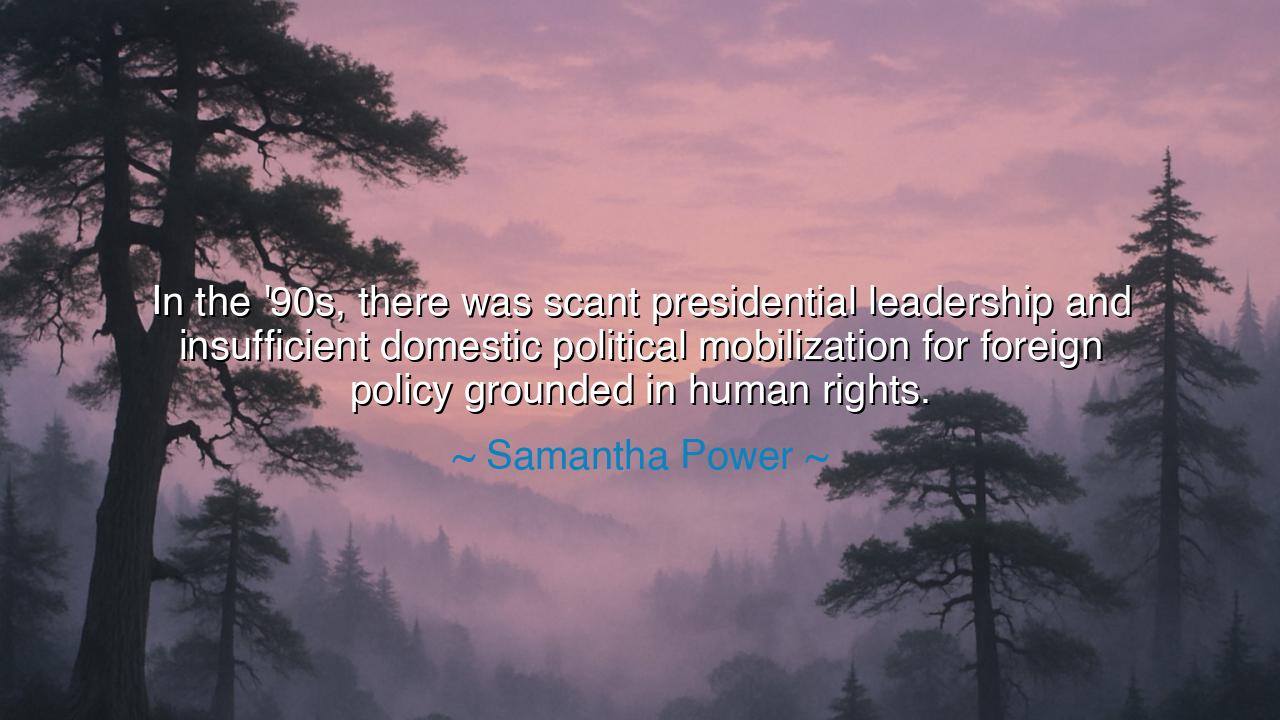
In the '90s, there was scant presidential leadership and
In the '90s, there was scant presidential leadership and insufficient domestic political mobilization for foreign policy grounded in human rights.






“In the '90s, there was scant presidential leadership and insufficient domestic political mobilization for foreign policy grounded in human rights.” – Samantha Power
When Samantha Power, a scholar, diplomat, and moral witness to the suffering of nations, uttered these words, she was not merely recounting a historical moment; she was offering a lament—a reflection upon a decade when the conscience of the powerful grew quiet while the cries of the oppressed echoed unanswered. In this quote, Power speaks of the 1990s, an age filled with promise after the Cold War, yet haunted by tragedies born of inaction. The world had emerged from the long shadow of nuclear fear, but instead of ushering in a new dawn of compassion, nations often turned inward, consumed by domestic concerns. Her words are an indictment of that complacency: a reminder that when leadership falters and moral courage retreats, injustice reigns unopposed.
The meaning of this statement lies in its moral weight. Power reminds us that human rights are not mere ideals to be praised in speeches—they are duties that demand action, especially from those entrusted with power. Leadership, she says, is not only the ability to make decisions, but the willingness to confront evil when silence would be easier. The 1990s saw genocide in Rwanda, ethnic cleansing in Bosnia, and countless other atrocities that unfolded under the indifferent gaze of the international community. Power’s words call us to remember that these horrors did not happen in a vacuum; they were permitted by hesitation, by the fear of political cost, and by the absence of moral resolve.
The origin of Power’s conviction lies in her own journey as a journalist covering the war in the Balkans. She saw with her own eyes the suffering of innocents, the charred ruins of villages, the faces of refugees whose only crime was belonging to the wrong faith or ethnicity. In those dark places, she witnessed the cost of political apathy. Later, as she reflected upon those years, she saw that the problem was not ignorance, but indifference. The leaders of the age knew of the suffering—but without domestic support, without the will of the people behind them, they did not act. Hence her phrase: “insufficient domestic political mobilization.” For even the greatest of leaders cannot move without the voice of the people urging them toward justice.
One cannot understand her warning without recalling the tragedy of Rwanda in 1994, when nearly a million people were slaughtered in a matter of weeks. The world watched in paralysis. Governments issued statements of concern, but no armies marched, no intervention came, no great nation risked its reputation to stop the rivers of blood. Later, those same governments would say, “We did not know.” But as Power points out, they did know—they simply did not act. The absence of presidential leadership and political mobilization made it possible for evil to thrive in the open. The lesson was as clear as it was painful: when morality is not rooted in policy, compassion dies in bureaucracy.
And yet, Power’s words are not only an accusation—they are a call to transformation. She reminds us that the soul of a nation is revealed not in its prosperity, but in its response to suffering beyond its borders. To ground foreign policy in human rights is to recognize the shared dignity of all peoples, to see that injustice anywhere weakens justice everywhere. The failure of the 1990s, then, is not simply historical—it is a warning that returns to every generation. For each age will face its own Rwanda, its own Bosnia, its own moment when silence tempts and action costs dearly.
The true wisdom of Power’s reflection lies in its understanding of democracy itself. A government cannot act for humanity if its people are unmoved by humanity’s plight. The mobilization of the people—their voices, their conscience, their willingness to demand justice—is the heartbeat of moral leadership. It is not enough to elect wise rulers; citizens, too, must become stewards of compassion. In this, Power’s message transcends time: that the power of the state flows from the moral awakening of its citizens.
Thus, the lesson for us is eternal: leadership must be both strategic and moral, and citizenship must be both active and compassionate. When we see suffering, let us not ask, “Is it our concern?” but rather, “If not ours, whose?” Let us learn from the 1990s, that age of missed chances and quiet hearts. Let us build a world where the defense of human dignity is not an afterthought but the very foundation of policy. For as Samantha Power reminds us, history does not only judge those who commit evil—it judges those who, in their silence, allow it to thrive.






AAdministratorAdministrator
Welcome, honored guests. Please leave a comment, we will respond soon